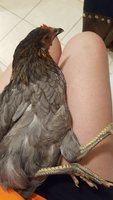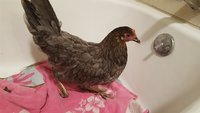ChickieShelly
In the Brooder
- Jun 9, 2018
- 11
- 8
- 19
Okay, I'm new to chickens but I've been in veterinary medicine for almost 20 years. Well, I foolishly got a new chicken ( Whiting true blue) and brought her into my flock about 2 weeks ago. She is about 3-4 months old and has been completely healthy up until this point. Suddenly today new chicken is down. Chicken has no proprioception reflects in her right foot, right-wing seems to have some paralysis as well, left leg seems to be overcompensating for the lack of right. Leg and foot palpate completely normal , no signs of crepitation or swelling anywhere in the leg/foot. Pupils are equal and normal , chicken is bright and alert just floppy and not walking. Hopefully the video will post for y'alls opinion.
My first fear goes to Marek's. But I've never seen a confirmed case of mareks. I know the only thing for true diagnosis of Marek's is a necropsy, but I'm trying to not be over dramatic and jump to worst case scenario. The rest of my flock is about 6 months old, I've had them since they were freshly hatched peepers, purchased from a local feed store and vaccine history unknown. They're all strong and healthy, and have been non-symptomatic since I've had them.
New chicken has been in the coop with my others with a barrier during the day and roosting with them in the evening to prevent picking on her, but can't completely rule out injury. If this is Mareks, have I given my whole flock this virus? Do I cull her to protect them or continue to isolate and see of she improves because they've already been exposed?
My first fear goes to Marek's. But I've never seen a confirmed case of mareks. I know the only thing for true diagnosis of Marek's is a necropsy, but I'm trying to not be over dramatic and jump to worst case scenario. The rest of my flock is about 6 months old, I've had them since they were freshly hatched peepers, purchased from a local feed store and vaccine history unknown. They're all strong and healthy, and have been non-symptomatic since I've had them.
New chicken has been in the coop with my others with a barrier during the day and roosting with them in the evening to prevent picking on her, but can't completely rule out injury. If this is Mareks, have I given my whole flock this virus? Do I cull her to protect them or continue to isolate and see of she improves because they've already been exposed?






 . I do have a mild strain of the disease though and I know other peoples' experiences with hotter strains can be more drastic.
. I do have a mild strain of the disease though and I know other peoples' experiences with hotter strains can be more drastic.